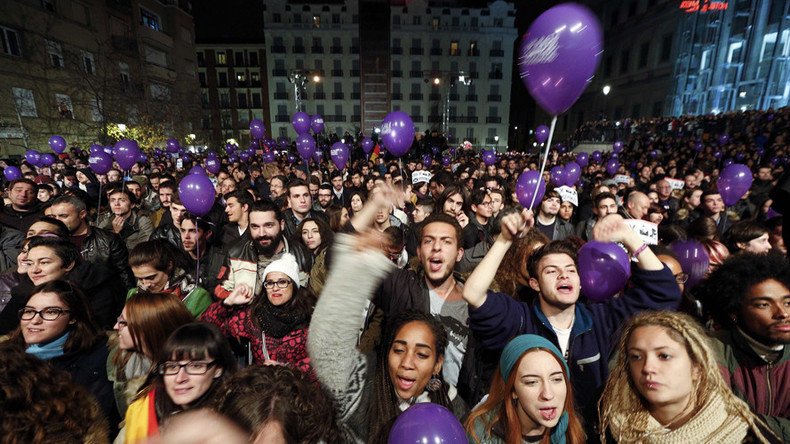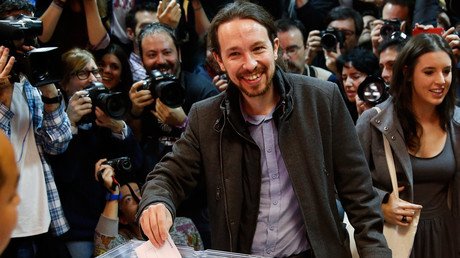‘Anger rising as world's youth face future of short-term, low-paying jobs’

Since the collapse of the Soviet Union free market neoliberal ideas have been ruthlessly imposed on the world and now people are rejecting them in the wake of the financial crisis, says political analyst Caleb Maupin.
RT: Podemos (left wing anti-austerity party in Spain) has some quite radical policies: state control of key industries, leaving NATO. Do you think these ideas are gaining force in Europe? Is there a growing trend to lean more towards left wing populist policies in Europe?
Caleb Maupin: I think there absolutely is. Spain has just been suffering under the wave of austerity. Schools across Spain are closing down. The average school in Spain right now has 40 students per classroom. The cuts in government spending have been devastating communities across the country. And now people in Spain are saying: “We’ve had enough”. And the belief that we need a completely free market, unregulated capitalism, this is being rejected by people in Spain, people all across Europe and all across the world. Since the collapse of the Soviet Union, free market, neoliberal ideas have been ruthlessly imposed on the world and now people are rejecting them in the wake of the financial crisis.
RT: You were a prominent figure in Occupy Wall Street which was partly inspired by the anti-austerity movement in Spain four years ago. What has changed since then?
CM: I think that Occupy Wall Street and the other upsurges that took place in 2011 were kind of an expression of anger. They were not really clear; they didn’t really make any demands nor have any program. But that is changing. The young people who are surviving in this low wage economy facing a life of short-term, low-paying jobs are very angry and they are trying to find a way to express their anger and make sure the issues they are concerned about become addressed…. So many of the young people who used to have a place in the middle classes that once existed in Western Europe and the US are very frustrating to see what’s happened. The good paying industrial jobs just are not there, and it is a very frustrating situation for millions and millions of young people in Western countries. And there is a rising amount of anger all across the world at the players responsible for the financial collapse.
Salman Shaheen, Editor-in-Chief of the World Weekly, commented on Spain’s election and European austerity policy: “People are reacting angrily to the turn in economic fortunes that they’ve experienced. Austerity has produced a movement across Europe in the countries the most affected, primarily the eurozone countries where the bailouts have happened and there have been quite harsh austerity measures as we’ve seen in Spain, pushing up unemployment rates and youth unemployment rates to 50 percent where much of the Podemos vote has come from young people. That’s not to say that it is just a short-term phenomenon. I do think the voters are voting in their rational interests. And if they see this party has a manifesto that appeals to them, then they will go for it. And if you look at the trend of these rising movements on the left, it goes way back before austerity in Europe. You can look at the Pink Tide in Latin America beginning in Venezuela and Bolivia where you have these traditional political structures dominated by two parties for so long and people are beginning to see that they want to have an alternative to that. And I think that is a long-term trend that’s changing.”
RT: ’Socialism’ has always been a dirty word in American politics and yet now Bernie Sanders who openly declares himself as a "democratic socialist" has managed to garner huge support. How did this happen?
CM: It’s a response to the change in circumstances. When Barack Obama ran for president in 2008 he was called “socialist” as an insult. But now Bernie Sanders is proudly calling himself “a Socialist” and people are rallying around him. There is frustration with the way things are. People don’t want to live under a low-edge police state. They don’t like what Wall Street and the big corporations have planned for the future. They are frustrated and they want things to change. And they are expressing themselves at the polls. Whether or not these candidates really represent them or not they have to talk as if they are opposed to the way capitalism is taking the world.
The statements, views and opinions expressed in this column are solely those of the author and do not necessarily represent those of RT.













